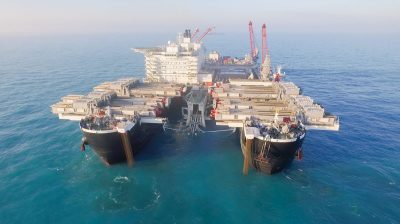Putin Visits Turkey to Inaugurate New ‘Strategic’ TurkStream Pipeline
The landmark pipeline project will carry Russian gas to Turkey and Europe via the Black Sea, bypassing Ukraine

Turkish President Recep Tayyip Erdogan will host his Russian counterpart Vladimir Putin in İstanbul on Monday for a ceremony marking the completion of the sea section of the TurkStream natural gas pipeline.
The two leaders are expected to meet later today to discuss regional affairs and economic relations between Russia and Turkey.
Monday’s meeting between Putin and Erdogan will be the third time the two leaders have met this month.
TurkStream, when completed, will consist of two lines and have the capacity to transport 31.5 billion cubic metres worth of gas from Russia. The first line will carry 15.75 billion cubic metres of gas to Turkey and the second line will transfer Russian gas to Europe via Turkey.
The pipeline will go to Europe either through Bulgaria and Serbia or through Greece and Italy and become operational by the end of 2019.
“This project will cement military and trade relations between Turkey and Russia because it is creating a mutual interdependence,” said Ogutcu.
“It might also help Turkey to fulfil its aim of being an energy hub, but it depends on how and under which conditions the pipeline will reach Europe.
“This project will play a key role in Turkey’s energy security and carry gas directly to Turkey and decrease the risks of transit gas.”
Russian Energy Minister Alexander Novak on Sunday praised the Turkstream project and described it as a “landmark project” between the two countries.
“Turkey has become a natural gas bridge for Southeastern Europe with the TurkStream project,” Novak told Anadolu Agency in an exclusive interview.
The minister added that the Turkstream project will be the basis of long-term cooperation between the two countries. Other energy projects on the cards include the Akkuyu Nuclear Power Station on Turkey’s Mediterranean coast.
The $20bn project will be financed and built by Russia’s state-owned Rosatom, one of the biggest international projects undertaken by the Russian nuclear energy firm.
Despite Moscow and Ankara increasing its cooperation in the Middle East, they are also trying to boost their trade relations.
Turkey is hoping to resume visa-free travel between the two countries after it was stopped following a Russian jet being downed by Turkish armed forces after Russia violated Turkey’s border with Syria.
Idlib deal
In September 2018, Erdogan and Putin agreed on a roadmap to clear Idlib of the former al-Qaeda affiliate Hayat Tahrir al-Sham without the need for military intervention.
According to the roadmap, both countries would create a 15-20 kilometre demilitarised zone between rebels in Idlib and Syrian government forces by mid-October. All fighters in the zone are expected to hand over their heavy weapons. The deal has come under pressure as sporadic clashes between rebel groups and Syrian government forces continue to persist.
The two countries have also grown closer in a bid to carve out a political solution to the Syrian issue.
In October, Turkey hosted a summit with France, Germany, and Russia to discuss the Syria situation. The summit pushed for a committee to draft Syria’s post-war constitution before the end of the year.
Moscow has also shared Turkey’s concern over US backing of the pro-Kurdish People’s Protection Units (YPG) in Syria. Russian Foreign Minister Sergei Lavrov last month said that the US is illegally seeking to establish a quasi-state in Syria through their allies.
The US has long claimed the YPG – who operate as part of the Syrian Democratic Forces (SDF) – are an essential ally in the fight against the Islamic State (IS) group in Syria. Turkey, however, considers it an extension of the outlawed Kurdistan Workers’ Party (PKK) which is designated a terrorist group by Turkey, the US and the European Union.
However, as tensions between Turkey and the US continue over US support for the YPG, last weekend US President Donald Trump and his Turkish counterpart Recep Tayyip Erdogan spoke in Paris and underlined their “determination” to try to rebuild ties.
In June, the US Senate approved a bill that would block or delay the sale of F-35 fighter jets to Turkey, and earlier this month, US President Trump delayed the delivery of US-made jets to Turkey for at least 90 days.
*
Note to readers: please click the share buttons above. Forward this article to your email lists. Crosspost on your blog site, internet forums. etc.

